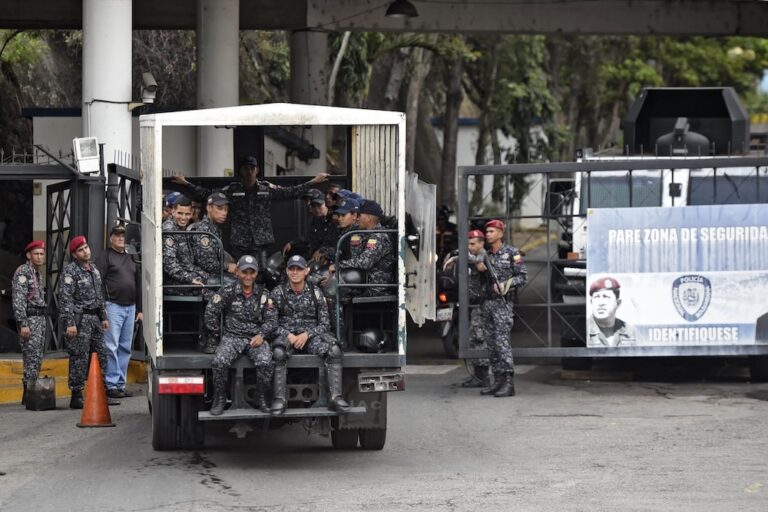On January 5th, 2017, the live broadcasts of open-signal radio stations were obstructed, during the swearing-in of the new board of directors of the National Assembly (AN), the highest legislative entity.
On January 5th, 2017, the live broadcasts of open-signal radio stations were obstructed, during the swearing-in of the new board of directors of the National Assembly (AN), the highest legislative entity. The national government broadcast Notipatria, an information news program which lasted from 11:55 a.m. to 12:45 p.m., and was compulsory broadcasting for stations, according to the Law on Social Responsibility on Radio, Television and Electronic Media, despite it being a violation to freedom of expression.
The image on national TV stations as well as the audio of the nation’s radio stations were replaced by Notipatria, including the rebroadcast of the previous day’s official speech by President Nicolás Maduro announcing changes to his cabinet ministers. On January 4, 2017, the President designated Tareck El Aissami, governor of Aragua state, as the vice president of the republic. He also designated 11 new ministers.
Hernán Alemán, congressman at the national assembly for the Mesa de la Unidad Democrática (MUD), said on Twitter that pro-official party supporters installed loudspeakers to broadcast the official speech.
50 minutes later, once the information program had ended, privately owned TV stations Venevisión, Globovisión and Televen broadcast the speech by Julio Borges when he was sworn in as president of the National Assembly. Congressman Freddy Guevara was sworn in as first vice president and congresswoman Dennis Fernández as the second vice president for the legislative power.
The official Twitter account of the Parliament, @AsambleaNacionalVE shared the broadcast of the January 5th session via a signal from its television station El Capitolio TV.
Article 10 of the Law on Social Responsibility on Radio, Television and Electronic Media (Ley Resorte-ME for its acronyms in Spanish) states the free and compulsory broadcast of information messages or official allocutions broadcasts on radio and television managed by the national executive branch of power. This norm prohibits national media from interfering with State messages or speeches broadcast as per the same article.
Visit by Conatel to Globovisión TV station
Globovisión, a privately owned information TV channel, reported on its website that seven Conatel officials went to its main office in Alta Florida, Caracas. The television station said that the purpose of the visit by the agency was “the inspection of the facilities, operation and telecommunications services nationwide”.
Although the channel cannot be certain if there is a direct relationship between this and another indicent, this action by Conatel happened after President Maduro, on January 4, accused Globovisión, of lying about the disappearance of a helicopter in Amazon state, to the south-east of the country. “The television station called Globovisión lied again a few days ago, mocking the honor of the family members and has not apologized, correct? Always Globovisión come on, always Globovisión, ah? It has not made a correction, it does not care about the morale of the Armed Forces, of the indigenous people, of the family members who are in anguish”, said the President.
Mayela León, the general director of Globovisión, confirmed the inspection by the Conatel officials of the TV station’s main office. She said that although the visit of the representatives of the agency generated “suspicion” one day after the mention by the President, the officials were complying with an administrative provision that authorizes them to make such inspections.
León said that the workers of Globovisión permitted the Conatel officials to conduct the inspection. The officials requested to review the channel’s technical documentation, specifically on the use of radioelectric activity. On the afternoon of January 5th, 2016, the officials were at the TV station’s main office.
Vladimir Villegas, host of the program “Vladimir a la 1”, broadcast on Globovisión, questioned Conatel’s visit to Globovisión.
The report entitled Conatel sintonizando con el Psuv, (Conatel in Tune with the PSUV) published by IPYS Venezuela in December 2016 revealed that the television has been the second most affected media, with 25 channels, followed by radio, with 87 stations. IPYS Venezuela tallied 11 actions which resulted in investigations, fines and seizures against Globovisión from 2005 to 2013. In 2013 its sale was to be finalized and with it an evident change in its editorial line, which “coincided with the disappearance of Conatel’s actions against it”.
At least 1,116 media outlets simultaneously broadcast the compulsory programmes per the mandate of the Venezuelan state in 2014, according to the report entitled Un país en cadena (A Nation in Chains) published by IPYS Venezuela. The analysis demonstrated how the compulsory programmes are used as an arbitrary mechanism for the imposition of control over content and the information agenda for political party purposes.
IPYS Venezuela recalled that the State has the right to manage the radioelectric spectrum and address official messages to the nation, but the government may not restrict citizens from freely accessing content of public interest by imposing the compulsory broadcasting of governmental messages through the radioelectric system.


